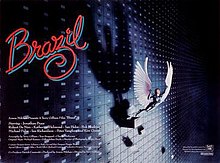
Back البرازيل (فيلم 1985) Arabic البرازيل (فيلم 1985) ARZ Бразілія (фільм) Byelorussian Бразилия (филм, 1985) Bulgarian Brazil (film) Breton Brazil (pel·lícula) Catalan Brazil Czech Brazil Danish Brazil (1985) German Μπραζίλ (ταινία, 1985) Greek
| Brazil | |
|---|---|
 UK theatrical release poster by Bill Garland | |
| Directed by | Terry Gilliam |
| Screenplay by |
|
| Produced by | Arnon Milchan |
| Starring | |
| Cinematography | Roger Pratt |
| Edited by | Julian Doyle |
| Music by | Michael Kamen |
Production companies |
|
| Distributed by |
|
Release dates |
|
Running time | 142 minutes[5] |
| Countries | |
| Languages | English French German |
| Budget | $15 million[7] |
| Box office | $9.9 million (US)[nb 1][8] |
Brazil is a 1985 science-fiction dystopian black comedy film[9][10] directed by Terry Gilliam and written by Gilliam, Charles McKeown, and Tom Stoppard. The film stars Jonathan Pryce and features Robert De Niro, Kim Greist, Michael Palin, Katherine Helmond, Bob Hoskins, and Ian Holm.
The film centres on Sam Lowry, a low-ranking bureaucrat trying to find a woman who appears in his dreams while he is working in a mind-numbing job and living in a small apartment, set in a dystopian world in which there is an over-reliance on poorly maintained (and rather whimsical) machines. Brazil's satire of technocracy, bureaucracy, hyper-surveillance, corporate statism, and state capitalism is reminiscent of George Orwell's 1949 novel Nineteen Eighty-Four,[11][12][13] and it has been called Kafkaesque[14] as well as absurdist.[13]
Sarah Street's British National Cinema (1997) describes the film as a "fantasy/satire on bureaucratic society", and John Scalzi's Rough Guide to Sci-Fi Movies (2005) describes it as a "dystopian satire". Jack Mathews, a film critic and the author of The Battle of Brazil (1987), described the film as "satirizing the bureaucratic, largely dysfunctional industrial world that had been driving Gilliam crazy all his life".[15] Despite its title, the film is not about the country Brazil nor does it take place there; it is named after the recurrent theme song, Ary Barroso's "Aquarela do Brasil", known simply as "Brazil" to British audiences, as performed by Geoff Muldaur.[16]
Though a success in Europe, the film was unsuccessful in its initial North American release. It has since become a cult film. In 1999, the British Film Institute voted Brazil the 54th greatest British film of all time. In 2017, a poll of 150 actors, directors, writers, producers and critics for Time Out magazine saw it ranked the 24th best British film ever.[17]
- ^ a b McAuley, Paul (2004). Brazil. Palgrave Macmillan. ISBN 1844577953. Archived from the original on 12 July 2020.
- ^ a b Pym, John (1985). "Brazil". Monthly Film Bulletin. 52 (612). British Film Institute: 107–108.
dist— 20th Century Fox. p.c.— Brazil Productions
. - ^ Hunter, I.Q. (2002). British Science Fiction Cinema. Routledge. p. 182. ISBN 1134702779.
pc production company (distributors not given)
. - ^ Hunter, I.Q. (2002). British Science Fiction Cinema. Routledge. p. 206. ISBN 1134702779.
pc Brazil Productions
. - ^ "Brazil". British Board of Film Classification. Archived from the original on 20 January 2015. Retrieved 20 January 2015.
- ^ "Brazil (1985)". London: British Film Institute. Archived from the original on 11 July 2012. Retrieved 21 August 2015.
- ^ "BFI Screenonline: Brazil (1985)". Screenonline. Archived from the original on 27 December 2014. Retrieved 20 January 2015.
- ^ "Brazil (1985)". Box Office Mojo. Archived from the original on 13 February 2013. Retrieved 20 January 2015.
- ^ Anders, Charlie Jane (19 October 2015). "50 Brilliant Science Fiction Movies That Everyone Should See At Least Once". Gizmodo. Archived from the original on 28 October 2015. Retrieved 29 October 2015.
- ^ "Dystopia and Science Fiction: Blade Runner, Brazil and Beyond". Santa Barbara: University of California Press. Archived from the original on 9 November 2020. Retrieved 29 October 2015.
- ^ Rogers, Richard A. (1990). "1984 to Brazil: From the Pessimism of Reality to the Hope of Dreams" (PDF). Text and Performance Quarterly. 10 (1). Abingdon, England: Taylor & Francis: 34–46. doi:10.1080/10462939009365953. Archived (PDF) from the original on 15 July 2012. Retrieved 22 January 2012.
- ^ Bartz, Rob. Dystopia: A Look at Utopian Societies in Literature (Thesis). Fargo, North Dakota: North Dakota State University. Archived from the original (DOC) on 13 July 2012. Retrieved 22 January 2012.
- ^ a b Podgorski, Daniel (7 January 2016). "1984 with a Sense of Humor: The Surreal, Wonderful, and Haunting Humor of Terry Gilliam's Absurdist Masterpiece, Brazil". The Gemsbok. Archived from the original on 8 November 2020. Retrieved 30 July 2019.
- ^ Puddicombe, Stephen (4 July 2017). "Brazil: five films that may have influenced Terry Gilliam's dystopian masterpiece". British Film Institute. Archived from the original on 19 June 2022. Retrieved 30 July 2019.
- ^ Matthews, Jack (1996). "Dreaming Brazil". Brazil (Media notes). Gilliam, Terry (director). Criterion Collection.
- ^ Kinnear, Simon (8 March 2014). "Re-Viewed: Terry Gilliam's Prescient Sci-Fi Brazil". Digital Spy. London, England: Bauer Media Group. Archived from the original on 12 December 2015. Retrieved 27 November 2015.
- ^ Calhoun, Dave; Huddleston, Tom; Jenkins, David; Adams, Derek; Andrew, Geoff; Davies, Adam Lee; Fairclough, Paul; Hammond, Wally (17 February 2017). "The 100 best British films". Time Out. London: Time Out Group Ltd. Archived from the original on 3 April 2019. Retrieved 24 October 2017.
Cite error: There are <ref group=nb> tags on this page, but the references will not show without a {{reflist|group=nb}} template (see the help page).
© MMXXIII Rich X Search. We shall prevail. All rights reserved. Rich X Search